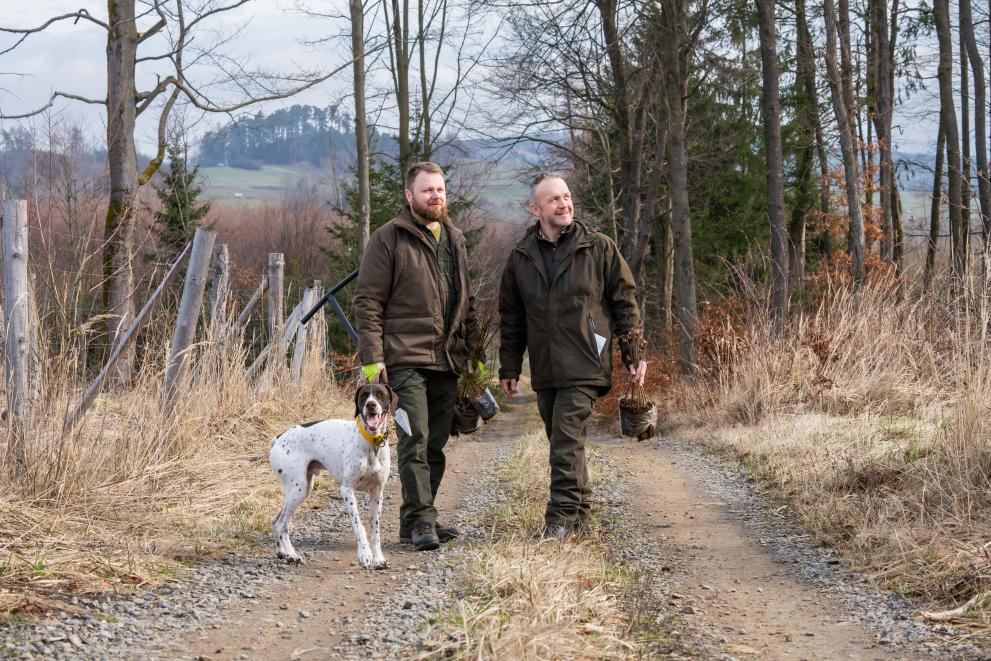
The NextGenerationEU stimulus package is helping power the green transition and promote smart, sustainable and inclusive growth. In Czechia, no less than €360 million in NextGenerationEU funds are being invested in climate-resilient forests, with the revitalisation of green areas and pursuit of more biodiversity-friendly forestry a key priority following devastating bark beetle infestations.
The Lesní družstvo obcí Měřín forestry cooperative and woodland area around Měřín, Vysočina, recently fell prey to such an infestation, with countless trees felled as a result. The cooperative is now replanting diverse native tree species, with funding from various sources, including NextGenerationEU. Since work began in 2021, the cooperative has replanted over 230 hectares of forest. We spoke with forest manager Pavel Bambula to gather his views.
Can you describe the project? How has NextGenerationEU funding helped?
PB: NextGenerationEU is just one source of funding, but an important one. Without EU funds, reforestation here would be difficult. Following the infestation, much of the land was cleared. To regenerate, we're moving away from a monoculture by planting various complementary tree species, from more basic varieties to deciduous ones that "ameliorate" or repair the soil, like oak and sycamore trees.
Why is it important to move away from a monoculture?
PB: Mixed forests are more resilient against bark beetles and harsh conditions. That said, fully replanting in this way can create issues for wildlife and habitats. As a result, we are only planting mixed tree species in cordoned-off areas. Conifers remain the primary plantation, constituting about 60% of what we plant, with "pockets" of more diverse species dotted around them.
“Without EU funds, reforestation here would be difficult.”
– Pavel Bambula, Forest Manager
Do all plantations succeed or is there a percentage that needs to be replanted?
PB: Around 5-10% of trees planted won’t make it on the first try. Precipitation, climatic conditions, the seasons, and the quality of sapling we receive all bear an impact. The survival rate is also influenced by workers planting the trees, who may do so heavy-handedly on occasion. That’s something we can’t fully oversee on such large-scale operations.
Have you faced many challenges with this project?
PB: Our fair share. Saplings have been damaged by rodents, as their populations have grown in the surrounding agricultural areas. There have also been administrative hurdles, as we apply for funding from various sources, with rules governing which trees we can plant and where we can plant them. Obtaining a permit for planting oaks at this altitude proved tricky, for instance.
“Moving away from a monoculture will improve the forest’s long-term viability.”
– Pavel Bambula, Forest Manager
What does the future hold? Will the project bring long-term economic benefits?
PB: Moving away from a monoculture will improve the forest’s long-term viability. We have planted over one million saplings since 2021, and large-scale reforestation provides local employment. Recreational areas should be developed in order to capitalise on tourism, which remains limited for the time being. Local landowners might also consider holding events. On the whole, a lush, healthy forest can only bring benefits.
Instead of short-term economic goals and monocultural solutions, NextGenerationEU promotes sustainable growth and respect for the natural environment. With the help of such funds, Lesní družstvo obcí Měřín’s reforestation initiative exemplifies smart investment in a natural resource. By diversifying tree species and replenishing land more sustainably, the project offers locals a better chance of reaping its benefits in years to come.
Details
- Publication date
- 1 July 2024
- Author
- Directorate-General for Communication
- Location
- Czechia
